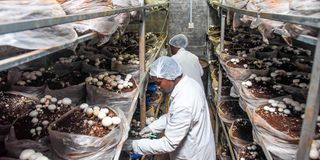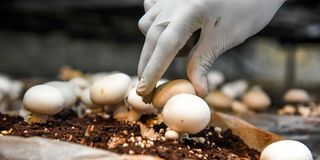
Garden mushrooms director Dennis Macharia poses with packaged button mushrooms at his farm in Matuguta Githunguri, Kiambu County on October 28, 2024.
Five years ago, Dennis Macharia's entrepreneurial zeal was nearly crippled. Hard work pays, the expression goes, but despite putting in the work, his farming ventures were taking more from him than they were offering in return.
That was the case with his coriander and cabbage farming where he felt held hostage by middlemen after every bumper harvest.
Then he switched to poultry keeping and quickly came to the reality that kills most a farmers' dreams- the high cost of feed. The Covid-19 pandemic, which send the cost of raw materials for formulating chicken feed skyrocketing was the last straw.
He shifted to mushroom farming, finding motivation from US–based fungi grower, Paul Stamets.
“Paul Stamets, through one of his e-books on mushroom farming, triggered my desire to venture into mushrooms,” Mr Macharia said during an interview at his farm in Matuguta, Githunguri, Kiambu County.
Stamets, an American mycologist and entrepreneur, is known for his extensive knowledge of fungi cultivation and has authored several books.
Sh20,000 seed capital
With a seed capital of Sh20,000, Mr Macharia, who also works at a pharmaceutical company, co-founded Garden Mushrooms with his wife.
Mr Macharia transformed an old chicken structure into a mushroom growing house and now boasts three modern growing houses.

Workers harvesting button mushrooms at Garden Mushrooms farm in Matuguta Githunguri, Kiambu County on October 28, 2024.
All are fully automated, insulated, and made of gypsum, with fans to regulate temperature and humidity.
Gypsum, a powder used to adjust the pH in mushroom growing substrates, enhances yields by supplying essential minerals and trace elements.
Substrates are the planting media for mushrooms. “Each house has a humidifier since mushrooms thrive in a controlled environment,” Mr Macharia says.
Over time, he has expanded his venture, growing from four employees to 25. Ten of these employees are permanent, while the remainder are contracted as casual workers.
The first hurdle that he needed to overcome was understanding the market landscape.
“When we started, mushrooms were expensive and were largely sold in upscale markets like Westlands in Nairobi,” he says, noting that he aimed to bridge the gap to ensure middle-income earners could access mushrooms.
Growth strategy
He attributes this growth to a reinvestment strategy, using proceeds from his business to fuel expansion. Mr Macharia has implemented cold room chain systems for preserving harvests, particularly when seeking competitive markets.

A worker harvests button mushrooms at Garden Mushrooms farm in Matuguta Githunguri, Kiambu County on October 28, 2024.
Finding a market is one of the biggest challenges that farmers face.
Mr Macharia’s target market consists of high-end hotels, restaurants, and supermarkets, with some buyers located at City Park in Nairobi.
He estimates that each growing house produces an average of 4,500 pun nets, each weighing 250 grammes. Prices for mushrooms at hotels range between Sh180 and Sh200, while supermarkets purchase them for Sh200 for resale.
The entire mushroom production cycle takes about 42 days, starting from preparing the substrates and planting of seeds referred to as spawns.
“We have adopted a synthetic system of composting the substrates, which allows us to produce mushrooms year-round,” he says of the process that shortens the time needed to prepare substrates from 30 days to just 15 days.
He has designated two rooms for substrates composting which involves mixing crushed wheat straw, which is soaked and supplemented with chicken manure, cotton seed, and gypsum.
From South Africa, Holland
However, he relies on imported spawns from South Africa and Holland, which complicates his expansion efforts due to the high cost of spawns.

Harvested button mushrooms pictured at Garden Mushrooms farm in Matuguta Githunguri, Kiambu County on October 28, 2024.
He primarily cultivates white button mushrooms.
“Every morning, I enjoy mushroom soup, and my children love burgers made from mushrooms and the crunchy varieties,” he says.
Is he eyeing the export market?
“At the moment, I cannot even meet my customers’ needs. I am overwhelmed by local demand,” he says.
Currently, he has utilised about a quarter of his eight-acre piece of land.
He emphasises that the success of his business venture has been a gradual process, fueled by hard work and a commitment to quality and innovation.
“Despite the initial challenges, I was resilient enough to make things work,” he says.









